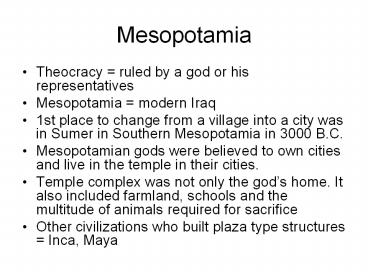Mesopotamia PowerPoint PPT Presentation
1 / 18
Title: Mesopotamia
1
Mesopotamia
- Theocracy ruled by a god or his representatives
- Mesopotamia modern Iraq
- 1st place to change from a village into a city
was in Sumer in Southern Mesopotamia in 3000 B.C. - Mesopotamian gods were believed to own cities and
live in the temple in their cities. - Temple complex was not only the gods home. It
also included farmland, schools and the multitude
of animals required for sacrifice - Other civilizations who built plaza type
structures Inca, Maya
2
Mesopotamia
- importance of irrigation
- a change in lifestyle. nomadic-gtsettled and
hunter-gatherer -gtfarmer - roles of women and men
- disparity between different classes
3
Mesopotamia
- Definition of city-state
- Differences between citizens of a city-state and
people in hunter-gatherer societies - Responsibilities of the city-state
- Careers
4
Mesopotamia
- Writing 1st appears around 8000 B.C.
- 2350 B.C Sargon builds the worlds 1st empire
from Syria-Persian Gulf, unifies cities by means
of religion - Enheduanna, daughter of Sargon high priestess
and worlds 1st author circa 2350 B.C.
5
Mesopotamia
- Religion Polytheistic culture worship of many
gods vs. monotheistic culture like Christianity
worship of 1 god - Temples local onesplain, impt ones constructed
on Ziggurats, the high mud-brick tower which
served as the base for a temple
6
Mesopotamia
- Palacesmany modern conveniences
- Social classes even slaves women had some
rights - Daily lifefood, school
- Moral values authority is necessary to prevent
chaos - Afterlife gloomy
7
Gilgamesh Epic
- Gilgamesh historical figure in Iraq
- Gilgamesh Epic written on clay tablets between
2150-2000 B.C. - Theme of close friendship between 2 young men.
8
Egypt
- Pharaoh was a human king who was god on Earth.
Instead of being a god of a particular city as in
Mesopotamia, he was the high priest of the entire
land and responsible for maintaining justice and
order.
9
Egypt vs. Mesopotamia
- fewer irrigation problems in Egypt
- Not difficult to defend
- Unified very early 3100 B.C, had system of trade
and irrigation. No large cities like Mesopotamia. - Pharaoh central figure required to keep order.
- Order main theme in religion, irrigation,
cosmos. Some similarities to Mesopotamian rel.
10
Pharaohs
- Role of pharaohs
- Great pyramids built circa 2600-2200 B.C
- Religious practices Pharaohs were worshipped as
well as other gods - Afterlife
11
The Egyptian Empire
- Akhenaten came to the throne in 1363 B.C.
- His wife was Nefertiti
- He attempts to impose monotheistic religion in
Egypt. - Akhenaten chooses Aton/Aten to be main god
instead of Amen - Tutankhamen comes to the throne 1347 B.C.
reverses Akhenatens changes
12
Society and Family
- Egyptians viewed themselves as a nation
- Careers available
- Calm lives, few wars, easy irrigation, steady
supply of food - Interest in ancestors, no interest in politics or
military life - High degree of freedom for women
13
Israel
- The Israelites had 2 difft kinds of religious
experience, intensely personal encounters with
God such as the experiences of Abraham and Moses
and sacrifices performed on behalf of the people
by the priests - The God of Abraham and Moses was called Yahweh
- Hebrews were a nomadic people.
- Took the name Israelites later when they settled
down and became a nation
14
Flood myths 1
- Gilgamesh Epic about 2 friends Gilgamesh and
Enkidu - Human life is precarious and the gods may allow
it to lapse into chaos yet again. - Gods sent a flood because humans were too noisy!
Utnapishtim built a boat, escaped flood and was
granted immortality. - Gods are shown to be capricious and uncaring.
15
Flood myths 2
- Similarities between flood in the Gilgamesh Epic
of 2150 B.C. and the Noah story in Genesis - boat
- some people and animals survive
- dove
- Differences between flood in the Gilgamesh Epic
and the story in Genesis - flood sent because men were too noisy Gil flood
sent because men were wicked Genesis - gods may flood Earth again Gil, God promises
never to flood earth again Gen - similarity to Greek mythology
16
Flood myths 3
- Deucalion and wife Pyrrha survive flood in an
ark. Later, an oracle told them to cast behind
them the bones of their mother (i.e., the stones
of the earth). From these stones sprang men and
women who repopulated the world. - Also similar to other Gk myths and to Gilgamesh
Epic in that Utnapishtim and his wife were
mortals who became immortal because of their
deeds.
17
Reminder slide for previously-discussed material
on Greek myth in the Archaic Period and 1 new item
- You should know these people/things
- Homers Iliad and Odyssey
- epic
- Heinrich Schliemann in Troy and Mycenae
- Sir Arthur Evans at Knossos, Crete
- Hesiods Theogony, Works and Days
- New item Homeric Hymns
18
Know these items from the late Archaic Era,
Classical Era and Hellenistic Era
- Pindar 518-438 B.C.lyric poet (late Archaic
period) - Tragedy performed at several festivals of
Dionysus (Classical era) - Tragedians Aeschylus, Sophocles, Euripides
(Classical era) - Apollonius of Rhodes Argonautica (Hellenistic
era)

